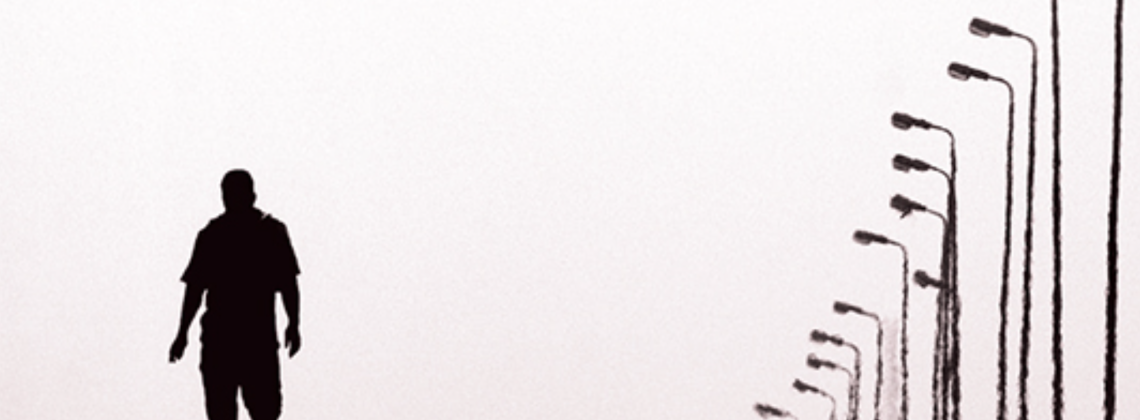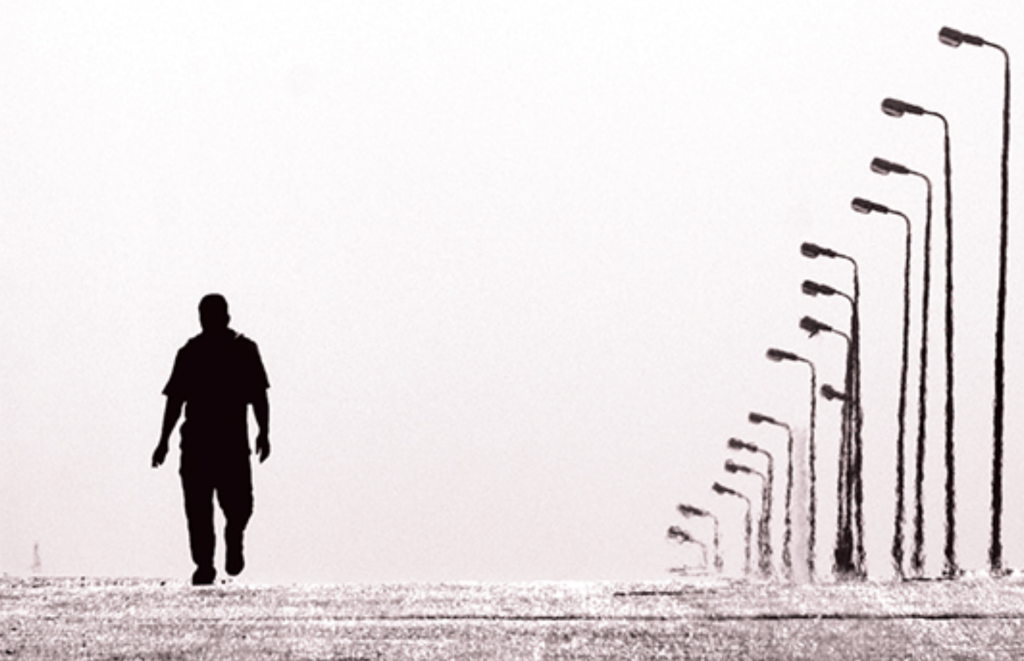

Freedom, eternity, and the question of God
Searching for Home: Poems by Robert Pack. Slant Books, 2023. 98 pp., $17.00 (paperback)
A few years back, my family fed an outdoor cat that we had named José. We left him food and water on our front porch in the hope that he might stick around and help defeat the hordes of mice in our barn. He did, for a while, and even left us odd tokens of feline appreciation on our welcome mat—beheaded birds or the occasional vole. He would disappear for weeks, making his home with neighbors who offered him better fare on their front stoops. Every time we had nearly forgotten about him, José would reappear, leaping up on the front porch, mewing and staring at us accusingly if he failed to find a full dish upon his return.
I thought about José while reading Robert Pack’s poems, because he was, among many things, a sensitive appreciator of the natural world. He seemed able to enter into nature with a receptive stance; he had, perhaps, a quietness that enabled him to see and experience the world on its own terms. Animals often pop up in his poetry—wild turkey, belly-flopping otter, and even deer who nibble pellet feed from his outstretched hand.
Such receptivity, so helpful for the cultivation of poetic vision, often goes hand-in-hand with vulnerability. Pack is vulnerable—and admirably open—to the big existential issues of life. He poses questions about humanity, freedom, eternity, and the presence or absence of God, particularly in times of suffering. Like our bedraggled barnyard cat, who just kept popping up again on our front porch, such questions appear repeatedly in this collection of Pack’s poetry, yowling, scratching outside the door of the mind, and demanding to be fed—whether with anxiety, ambiguity, or answers.
Searching for Home, Pack’s twenty-second book of poetry, is a collection gathered during the final years of his life. Memorial tributes for Pack describe him as a beloved father, husband, and teacher; he was a scholar of Wallace Stevens and a protégé of Robert Frost. Although he moved to Montana in his retirement, he was a longtime resident of Vermont. Among his many pursuits, he was a professor at Middlebury College and the director of the Bread Loaf Writers Conference for twenty-two years. Pack passed away in 2023, just after editing the final page proofs of Searching for Home. This makes his poems’ repeated wondering about what lies beyond the grave all the more poignant and pressing.
“My Odyssey” is one of the first stage-setting poems for the collection. Tracing a reenactment of Homer’s epic by sixth graders, this poem also hints that the poet is a boomeranging traveler, a man slung off from origins that always seem to pull him back again. The elderly poet, visually impaired at the end of his life, sees himself taking up the tradition of the blind bard who had “a special gift / for seeing contradictions in his characters.” The bulk of the poetic real estate in Searching for Home is taken up by longer poems, biographical character studies, written in both free verse and rhyme, portraying the lives of Darwin, Einstein, Moses, and even Pack’s own beloved Uncle Phil, a fugitive from Russia’s pogroms.
Pack, “blind and immobile in [his] sunken chair,” traces the quirks and contradictions of these characters. Each man asks some of Pack’s most pressing questions—is humanity willed, or just the product of blind chance? Is cold necessity the chief driving force pushing people forward in their lives, or does freedom truly exist? In the poems, their answers are given with firm determination, yet neither Pack nor his characters seem able to account for love, for affection, for grief, or for the eternal ache that prompts people to wonder and hope.
Pack’s longer poems are complemented by shorter lyrics, both rhyming sonnets and free verse poems, written from a more personal perspective. Pack is attentive to the natural world, writ large and small—he ponders evolution, relativity, and gravity; he writes of worms, of beetles scrabbling on a log. His heightened perception of the world is a balm and solace in the face of his existential doubts.
The sonnets stand out among all the shorter lyrics in this collection; they have a certain unity and flowing elegance. And yet, even with the turn to rhyme, the poems consider the same topics that seem to weigh heavy in the poet’s thoughts. In the book’s first sonnet, appropriately titled “Mind,” Pack reflects:
it follows when the scrutinizing mind
asks if it’s free to choose and thus begin,
or if it cannot know itself, is blind
with groping thoughts: salvation, grace, and sin.
Of all the sonnets, “Pain” may be the best. It ends on a querulous note, echoing the sense of transcendental abandonment that surfaces repeatedly in this collection. The repetitions here are reminiscent of Pack’s mentor, Robert Frost.
Without a mourner, there’s no one to sing
that anybody walked here by the sea
Or, forlorn in the woods, in search of me,
in search of me, my dear, in search of me.
Robert Pack characterizes himself as a “skeptic Jew” who “can’t / contend with pissed-off Yahweh” because he’s failed at God’s hard demands for holiness. Pack is afraid he’s not been generous to the poor, or complied enough (he thinks) with the Ten Commandments. Yet the poem most laden with affection and nostalgia is the nearly twenty-page character study of his uncle, Phil Kaplan. Phil was his mother’s brother, a Russian emigrant who fled the pogroms of the early twentieth century and made his home in Brooklyn. As Pack describes his uncle, he seems to sit at his feet in admiration and appreciation, wrangling with his own sense of affection for—and dismissal of—his Jewish roots. The epigraph of the poem is a selection from Phil’s eulogy: “He instructed us in the mores of an ancient people, / Which had known life in all its vicissitudes.”
At one point in the poem Pack asks “‘Why choose to be a Jew if one does not believe in God?’/ ‘The choice,’ Phil rapidly replied, / ‘Was made inside your mother’s womb.’” Both Pack and Phil are well-aware of history’s weight, of origins that feel deep and inescapable. The heft of Phil’s answer is immediately dissipated, however, with a quip he makes in the poem’s next line: “Besides, we Jews do have the best jokes.” Pack seems to see levity as a survival strategy in the face of questions or suffering. “‘Excruciating humor,’ Phil adjudicates / ‘is almost capable of making what is / unendurable endurable.’” Indeed, even the poet’s own impending death becomes more palatable in the poem “Playing Myself,” in which he imagines his own funeral, led by a yarmulke-clad brown bear who blows upon a ram’s horn. His ghostly self is quite “delighted that [he] got to hear / what [his] survivors had to say” and chastises his gathered mourners not to “forget my modesty.” He gazes at his witty tombstone, reading: “Here lies Bob Pack who never could retire, / he had so many ironies in the fire.”
This irreverent good humor was perhaps one of Uncle Phil’s gifts; he is a former rabbi who sees Abraham’s binding of Isaac on the pyre as a deft outbluff of God, rather than an act of faith-filled obedience. Phil sees the patriarch as a poker player, staring with calm amusement at a creator who might be forced to flinch. Pack’s uncle mourns for the disunity in the world while considering a move to Israel in 1948. He daydreams odd solutions to the hatred that simmers between peoples, such as decreeing that every marriage must be mixed, so that generations down the road would be “a little bit of everything.” In addition, cheeky Phil proclaims, wedding uniforms ought to include a Brooklyn Dodgers baseball cap, “the universal symbol / of good sportsmanship and loyal fans.” When he interprets the texts of Genesis through the equations of Einstein, though, one starts to wonder if Phil’s faith isn’t just offbeat but also crumbling: “to make the point that from the start / our universe was indifferent to life / and life was no more than an accident / or at most a failed experiment.”
Pack inherits his uncle’s interest in the state of Israel, ruminating on the percentages of Hamas rockets intercepted by the Iron Dome defense system and the risk of endless war in Israel. The Arab-Israeli conflict is an anguish for him. His affection for his Uncle Phil notwithstanding, Pack seems haunted by his Jewish roots. In a poem titled “By The Sea on Yom Kippur” the poet spends the day alone, wandering on shifting sands of doubt, wondering if there is some basic brokenness within him that contributes to the world’s predisposition to conflict. He asks if there is “meaning of my own / I needed now to be atoning for / With no one listening and no one / With the power to forgive.”
Pack’s solitary stroll clashes with the expectations of Yom Kippur, one of the holiest days of the Jewish calendar. On this day, observant Jews spend the day in corporate prayer and fasting, begging God’s forgiveness for the sins of the past year in a synagogue-set service. In contrast, the poet walks alone, thinking that he ought to atone “for not knowing how / [he] must atone,” and lamenting that “I do not know where my heart’s journey yet may lead / Or to what home I may return.”
The five-poem series that concludes the book features a biographical sketch of Einstein, beginning with the scientist’s own assertion that “I am a deeply religious nonbeliever.” Perhaps this characterizes not only the famous originator of the theory of relativity but also the poet himself. If some of the book’s free verse poems seem to be weighed down by language that is excessively prose-like, “Determining Einstein” is unified and lightened by rhyme and the lilt of loose iambic pentameter or hexameter lines. The last lines of the Einstein collection, and of the book itself, lean into the problematic ambiguity of the famous man’s last words; he spoke a phrase in his native language to a bedside nurse who did not know German, and his final thoughts were forever lost.
The concerns that reappear throughout Searching for Home are of the type that could sound bitter, but in Pack’s hands they are honest, even admirably good-humored. His poems are forthright and creative, with a warm openness to mystery and the natural world. Yet as I read, I couldn’t help but ache for the poet, and for his Uncle Phil—even for Darwin and for Einstein. Brilliant men all, they were also anguished, amidst their scientific certainties, about many of life’s central mysteries.
Recently my three-year-old daughter trundled past me with our newest cat, a tabby who is much tamer than the prowling José, cradled in her arms like a furry infant. There was a peace about the pair that made me think of Pack, sitting at ease upon his rock beneath “the tamaracks, the spruce, the aspen / and the ponderosa pines,” with a gentle deer eating from his hand. I pray that his eternal soul is similarly at peace. I pray he’s resting in the merciful arms of a Mystery, that he is finally getting many, if not all, of his lingering questions answered.
Carla Galdo has written essays and poetry for various groups and publications, including Well-Read Mom, Humanum, Dappled Things, and Modern Age. Carla earned an MTS from the John Paul II Institute for Marriage and Family and is pursuing an MFA in Creative Writing at the University of St. Thomas-Houston.